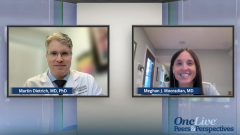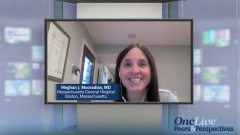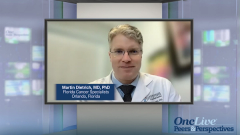
Future Perspectives in Biomarker Testing and Targeted Therapy in NSCLC
Expert oncologists look to the future of the NSCLC treatment landscape and discuss unmet needs and promising therapies.
Episodes in this series

Transcript:
Martin Dietrich, MD, PhD: If you had to look forward to what you’re most excited about with the next steps in therapy, can you give us a prospect on where you see the field heading based on what we already have in the clinic?
Meghan J. Mooradian, MD: Even before therapeutics, 1 thing we’ve harped on today is biomarkers. We’re getting more granular molecular biomarkers. Biomarkers might be more of an immunotypic phenotype and help us further delineate those who can benefit from single-agent combination therapy, with respect to antitumor efficacy but also identifying patients who may be at more risk for toxicity. For example, this may help us understand who to escalate or de-escalate based on what we already know.
As we move forward, the ADC [antibody-drug conjugate] landscape is incredibly exciting. I look forward to additional studies that are going to be published soon, especially when we’re thinking about these difficult-to-treat mutations, like STK11, KEAP1, and dual ICIs [immune checkpoint inhibitors]. There are some exciting studies looking at NRF2 inhibition or glutamine antagonist. All these studies are ongoing, many of which are open in phase 1 across multiple institutions. That’s what it’s going to need. As we distill down into more granular subtypes, we need that information, but the number of patients in those silos becomes smaller. It lends to academia and the community reaching together to perform these studies. This is in the clinic as well as important real-world studies that we’re getting to enhance all the knowledge we have.
This is a bit of a pivot, but 1 important study that came out was looking at KRAS. It was presented at SITC [Society for the Immunotherapy of Cancer Annual Meeting] this past fall. Dr [Charu] Agarwal looked at real-world studies of close to 3000 patients. This stratified how patients responded to first-line immunotherapy with or without chemotherapy, based on KRAS mutation status. It shed light on the fact that patients with KRAS G12C did incredibly well. They had the best median OS [overall survival], particularly when they were looking at PD-L1–high subgroups treated with immunotherapy, with or without chemotherapy. This confirmed that patients with STK11 and KEAP1 co-occurring with KRAS had poor outcomes, with a median OS of only about 11 months, I believe. Both the clinical trials that are ongoing across academia plus real-world data that are so valuable will hopefully help drive the field forward. What about you? What do you think are the exciting things to come in 2023?
Martin Dietrich, MD, PhD: In the second-line space, we’re going to see the antibody-drug conjugates take hold and allow us to have better options in the first-line progression setting. My quest, and something we do as an institution but also as a community in general, is aligning what we already know with the opportunities to implement them for every patient. This is like a no-patient-left-behind approach. We really try to do this.
It boils down to the availability of broad testing and ensuring that tissue and data procurement is state of the art. Additionally, that interpretation is supported by an expert panel that helps in this part. This is going to be a catchup, especially in lung cancer. There are many reasons, including tissue availability and the turnaround times. We’re not seeing the full consistency of the scientific data and the scientific application of what we know.
Transcript edited for clarity.






































